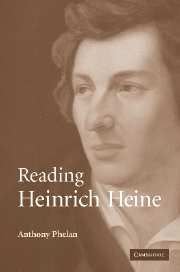Introduction
Published online by Cambridge University Press: 22 September 2009
Summary
1997 saw the two hundredth anniversary of the birth of Heinrich Heine, and the one hundred and fiftieth anniversary of his death falls in 2006. In the fifty years since the centenary of his death in 1956 his reputation, his canonical status, and perhaps even his popularity have been consolidated by enormous scholarly and critical activity. Towards the end of the last century, however, two commentators speaking from widely different positions challenged the prospects for Heine's continuing vitality, both within the academy and more generally in the future of literary culture.
Over a number of years Jeffrey Sammons, Heine's most important English biographer, has kept an acerbic eye on the mounting critical literature. He recently suggested that the intense preoccupation with Heine since the late 1960s has run its course and become exhausted. In response to this state of affairs, he has called for (and contributed to) a fuller understanding of the reception of Heine's work, and a return to careful readings of his style. The playwright Heiner Müller, on the other hand, responded to the award of the Darmstadt academy's Büchner prize in 1985 with a speech claiming that ‘Heine the Wound has begun to heal over, crooked; Woyzeck is the open wound.’ Müller's comment acknowledges the disturbance in German literary awareness caused by Heine, and evoked by Adorno's lecture ‘Die Wunde Heine’ (‘Heine the Wound’) in 1956, but suggests that it has been settled – though not set to rights. The remaining sore point is Büchner's Woyzeck.
- Type
- Chapter
- Information
- Reading Heinrich Heine , pp. ix - xivPublisher: Cambridge University PressPrint publication year: 2007



